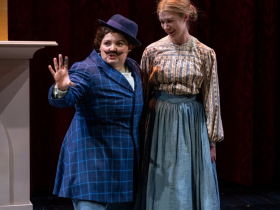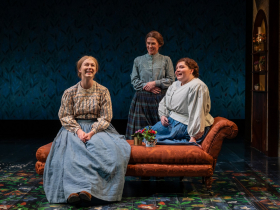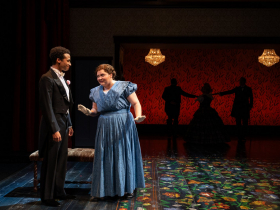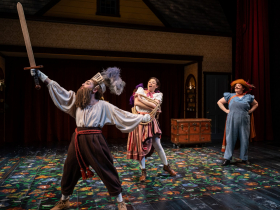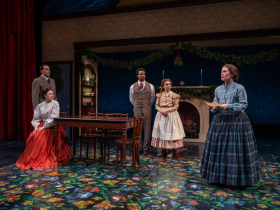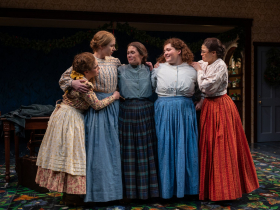Rep’s ‘Little Women’ Modernizes Story
Results are uneven, with characters speechifying and Three Stooges-like comic moments.
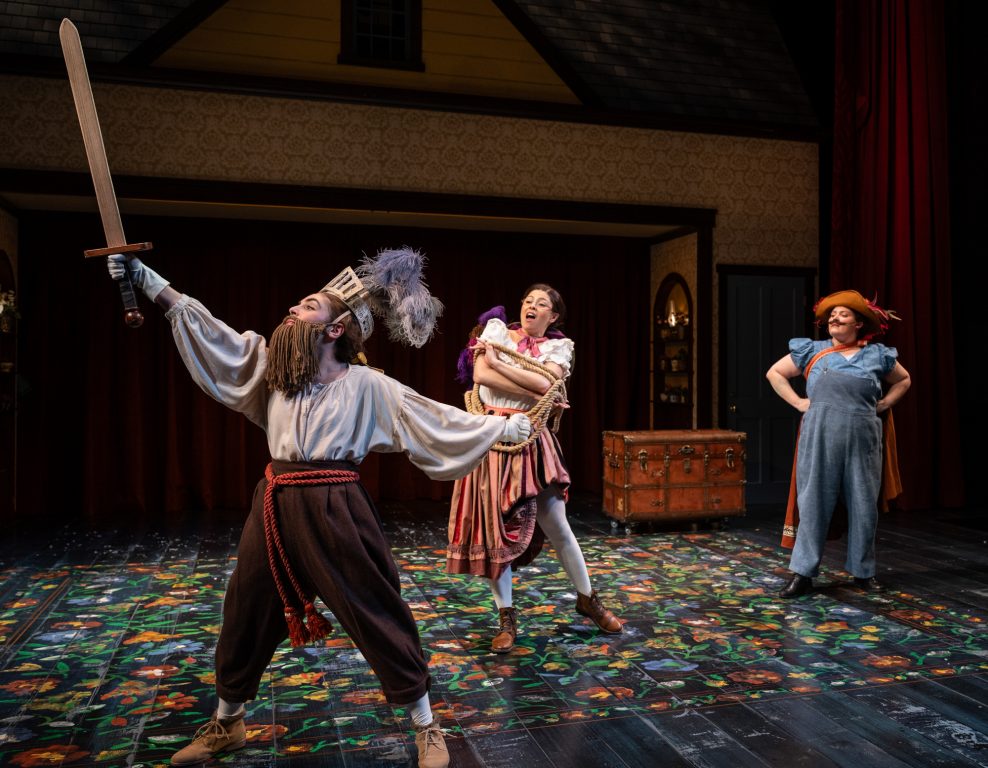
Milwaukee Repertory Theater presents Little Women in the Quadracci Powerhouse January 16 – February 18, 2024. Pictured Rebecca Cort, Cy Paolantonio and Amelio García. Photo by Michael Brosilow
It’s hardly a surprise that the Milwaukee Rep would splinter Little Women into a modernistic take echoing today’s social advances. After all, this is a famous, well-worn story with four successful movie versions in the sound era alone, plus multiple stage and TV adaptations about the March sisters (with a defiant Jo March who is fashioned much like the feminist socialist writer Louisa May Alcott herself).
The approach is meant to open your eyes to how restrictive those 1800s were for gender identity. The style and language of the revelations will be hard for some to take, expecting the quartet of March girls to roll along in family unity as time has fashioned them. Playwright Kate Hamill, who has successfully added modern flavor to authors like Jane Austen, has decided that the real Alcott (alias Jo) was screaming to get out of the box that even progressive society put women into during the Civil War.
Hamill, with the too accepting collaboration of director Marti Lyons, has allied her brain with what she perceives as the original Alcott spirit (set me free!) and has spun the characters far away from the Hollywood bent in looks and manner. The style is broad and so is the message.
The good news is these sisters’ squabble as children in large families do, none looking like they are steps away from the MGM studio makeup factory.
The bad news is that they squabble like the Three Stooges in wails and double-takes, exaggerating the comedy – except when they all bow down in sentimental obedience and hug their sacrificial mother Marmee (in this case Spring Green veteran Colleen Madden who has been more challenged in American Players Theatre roles).
In this version Amy is a nasty, hateful brat (over-demonstrated by Rebecca Cort), Meg is a near-sighted near spinster who turns into a self-doubting matron (a bluntly written part for Cy Paolantonio), Beth is even more directly called on to be the sickly conscience of the tale (here the obvious writing intrudes on the natural stage warmth of Kate Peabody), and Jo – well, this ain’t Katharine Hepburn.
Though shrugged disarmingly and spoken with blunt plump charm by Amelio Garcia, Jo is pointedly mannish and determinedly goofy in her desire to be let alone, reminding us every minute that in a different time (such as today) she wouldn’t be forced into girlish Victorian identity and (horrors!) pursue men. Garcia is forced to stand stage center and send this message many times (how many ways can she say I am not just a tomboy), as if the patrons would otherwise be too dumb to notice.
Similarly, her Laurie (played on screen by the heartthrob likes of Peter Lawford and Timothée Chalamet) is Peter Pan far more than Lothario, the awkward extremes handled with overlaid charm by Austin Winters.
In trying to dig into Hamill’s intent, director Lyons creates some pleasant family tableaus, but she also asks the audience to indulge in historical bifurcation. On the one hand some period effects are pleasant and thoughtful. An-lin Dauber’s parade of costumes are just the sort of getup poorer members of society would concoct for their own theatrics or social gatherings. Collette Pollard’s set uses a dollhouse miniature to imagine the March family home turned into an open playbox for Jo’s dramatics, with the cast shuffling furniture in and out. The narrow racist veneer of high society is skewered as needed.
Yet the wealthy Laurences next door – Laurie and his European traveling grandfather — are Black actors (the capable Chike Johnson not only plays Grandpa Laurence but the sensitive doctor caring for Beth and the father of the March household as well).
Now I am a lifelong champion of color-blind casting, letting the quality of Macbeth or Hamlet rule the choice of actor. It’s only difficult when race matters, for instance a Black Iago loathing the Moorishness of a white Othello. Maybe this production thought that it wouldn’t jar because there are no direct lines about race, just the whole atmosphere.
But I frankly was jarred in this, the most famous fiction of the Civil War era where the missing father is off fighting the war. Even the Rep play guide states bluntly what some recent presidential candidates couldn’t — that slavery was the central cause of the Civil War, a concept the March family underlies in its choice of military music.
You can’t ask the patrons to revel in the times while ignoring the color margins that infected the times.
Beyond the color issue, treating the supporting players as bit parts to double or triple cast like door stops, that’s a casting choice that robs them of any significant role in the story itself, forcing more of the heavy lifting of the plot on the March girls themselves. That weight on them shows in too many speeches.
This same cast did this production at the Seattle Rep first. Which means they have ironed out some rough spots, but also means they slightly anticipate when the laughs should come.
Little Women runs from Jan. 16 through Feb. 18. Tickets are available online.
Photos
Dominique Paul Noth served for decades as film and drama critic, later senior editor for features at the Milwaukee Journal. You’ll find his blogs here and here.
If you think stories like this are important, become a member of Urban Milwaukee and help support real, independent journalism. Plus you get some cool added benefits.
Review
-
Ouzo Café Is Classic Greek Fare
 May 23rd, 2024 by Cari Taylor-Carlson
May 23rd, 2024 by Cari Taylor-Carlson
-
‘The Treasurer’ a Darkly Funny Family Play
 Apr 29th, 2024 by Dominique Paul Noth
Apr 29th, 2024 by Dominique Paul Noth
-
Anmol Is All About the Spices
 Apr 28th, 2024 by Cari Taylor-Carlson
Apr 28th, 2024 by Cari Taylor-Carlson
Theater
-
‘The Treasurer’ a Darkly Funny Family Play
 Apr 29th, 2024 by Dominique Paul Noth
Apr 29th, 2024 by Dominique Paul Noth
-
Rep’s Nina Simone Play a Puzzle
 Apr 23rd, 2024 by Dominique Paul Noth
Apr 23rd, 2024 by Dominique Paul Noth
-
Skylight’s ‘Eternity’ Is a Slam Bang Show
 Apr 15th, 2024 by Dominique Paul Noth
Apr 15th, 2024 by Dominique Paul Noth

